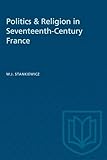Politics & Religion in Seventeenth-Century France / W.J. Stankiewicz.
Material type: TextSeries: HeritagePublisher: Toronto : University of Toronto Press, [1960]Copyright date: ©1960Description: 1 online resource (286 p.)Content type:
TextSeries: HeritagePublisher: Toronto : University of Toronto Press, [1960]Copyright date: ©1960Description: 1 online resource (286 p.)Content type: - 9781487581206
- 9781487580230
- 944/.03 23
- DC121.3
- online - DeGruyter
| Item type | Current library | Call number | URL | Status | Notes | Barcode | |
|---|---|---|---|---|---|---|---|
 eBook
eBook
|
Biblioteca "Angelicum" Pont. Univ. S.Tommaso d'Aquino Nuvola online | online - DeGruyter (Browse shelf(Opens below)) | Online access | Not for loan (Accesso limitato) | Accesso per gli utenti autorizzati / Access for authorized users | (dgr)9781487580230 |
restricted access online access with authorization star
http://purl.org/coar/access_right/c_16ec
The French Calvinists or Huguenots entered the seventeenth century enjoying the rights grated to them as a religious minority by the Edict of Nantes. Within eighty years they were suffering brutal dragonnades, and by the end of the century Calvinism was almost exterminated: it would be nearly another hundred years before religious tolerance would be restored in France. In examining this critical period, whose bigotry cast a long shadow into the twentieth century, Dr. Stankiewicz throws into relief the vast body of seventeenth-century French political ideas. He is particularly interested in the relations between political thought and historic events. Analytical rather than descriptive, his book examines the problem of toleration on many levels; it contrasts ideology with policy, domestic affairs with international issues, religion with politics, and theory with practice. The author cuts through a complex mass of material to appraise the relation between toleration -- or tolerance or tolerationism, whichever the case may be -- party politics, and revolutionary action. Most of the text is based on seventeenth-century documents in French, Latin, and English. In discussing these writings, Dr. Stankiewicz sheds new light on the concept of sovereignty, on the theories of the social contract and the divine right of kinds, on the conflict between these two, and on the questions of obedience and the right to revolt. Contemporary implications can be seen in his discussion of Pierre Bayle -- the "Philosopher of Rotterdam." Stankiewicz writes that Bayle's arguments for tolerance can be used as a commentary on the modern political predicament. They touch on the ever-present problem of the peril of subversives and on the validity of the reasons given by vigilantes intent on suppressing dangerous elements. The passing of the era of intense religious persecution does not mean that humanity has progressed to a point of tolerance for dissident minorities, but that hostilities have largely been shifted from the religious to the political sphere.
Mode of access: Internet via World Wide Web.
In English.
Description based on online resource; title from PDF title page (publisher's Web site, viewed 01. Nov 2023)


